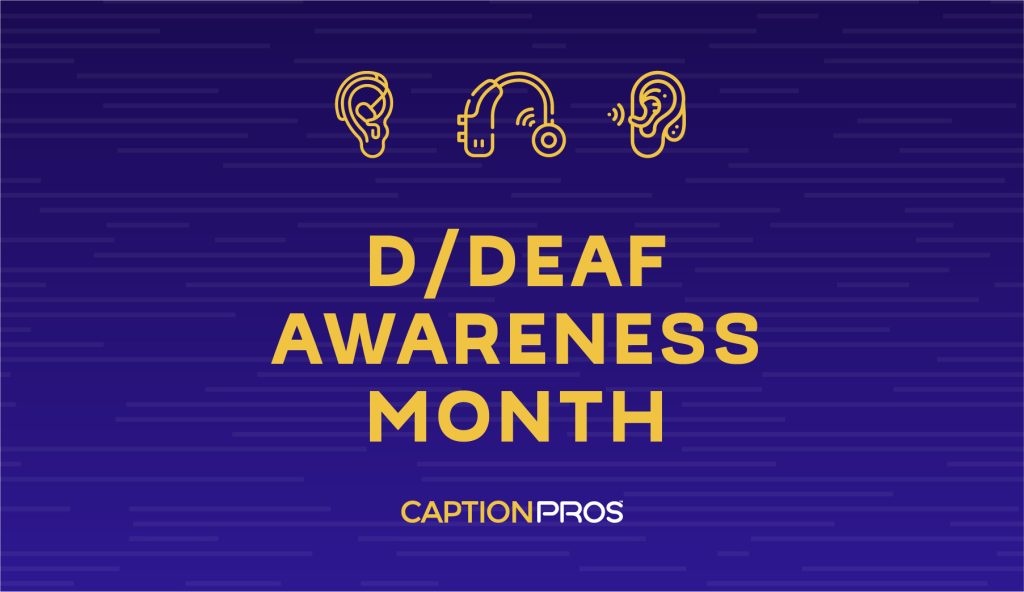Deaf Awareness Month
It’s deaf awareness month, which is a bit of an inadequate terminology for what we hope to accomplish. The world is aware of deaf people; we’ve seen the movies, probably even gone to elementary school with someone who was deaf, and seen sign language interpreters. However, what the d/Deaf community wants from people are consideration and understanding.
The importance of accessibility
Facts are facts; deaf and hard-of-hearing individuals don’t make up a large portion of the population. Across the United States, only 0.22% of its people are deaf, and 2.2% describe themselves as having trouble hearing. However, that doesn’t mean it’s a demographic that is insignificant. They are influencers, innovators, parents, success stories. Among them are musicians, business investors, doctors, and teachers. They shape the world just as any hearing person does.
Thinking about disabilities isn’t something people frequently have in mind when creating their designs. The abled have the privilege of never thinking about what it’s like to navigate the world as a person who has difficulty hearing, seeing, or walking. They think about what it’s like to be deaf perhaps once a year, if that, and as a result, they don’t implement accommodations into their content. It isn’t something done out of malice; it’s simply a lack of forethought. By normalizing accessibility standards, we hope to put it at the forefront of everyone’s minds.
Restricted accessibility limits those who have difficulty hearing from impacting and interacting with hearing communities. If a lecture lacks captioning and sign language translation, it misses essential questions and points a deaf or hard-of-hearing person could make. It deprives the world of the expression of brilliant minds and stunts the intellectual development of the field and educational culture.
How to make the world inclusive
So how can you help make the world more inclusive for deaf communities? Check out our list of tips for making your workplace inclusive here!
Think about the volume of your voice when speaking and speak clearly. This doesn’t mean shout, but recognize that not everyone can hear low voices and mumbled annunciation. This applies to all group settings. Not everyone who struggles with hearing loss will disclose it to you, so don’t assume the company you’re in has perfect hearing.
Ask for accommodations on behalf of others. If you’re attending a seminar, you can request that they provide captioning and sign language translators. Find ways you can make your workplace more inclusive.
Communicate with consideration. Whoever you’re speaking with, don’t get frustrated when asked to repeat yourself. When talking to a deaf person, ask their preferred method of communication. Take a few minutes to learn some primary sign language that may be necessary, like “help,” “yes,” and “no.” And always look at the person you’re addressing! Facing the person is necessary for lip reading.
Caption your content! It’s such a simple gesture to make your content inclusive and make the lives of those who are deaf or hard of hearing easier.
Caption Pros provides a wide range of caption services
- On-site event captioning: Words can be projected on a screen alone or open-captioned with video
- CART Captioning: Streams words directly to the internet for instant reading on mobile devices, laptops, or tablets.
- Instant transcription: Translates spoken words using computer-aided transcription. This is great for news conferences
- Webcasting: Real-time speech-to-text translation for webcasts, webinars, and social media live streams
- Broadcast captioning: Provides captioning for local and national news programs, conferences, government and city council meetings, and athletic events
Captioning is not just a service for those who have trouble hearing, but how it allows deaf individuals to access media and events is an incredibly fulfilling prospect of our business that we would never want to do without. We hope you took time this month to learn more about deaf people in society and the incredible impact they’ve had on the world. Contact us today!







